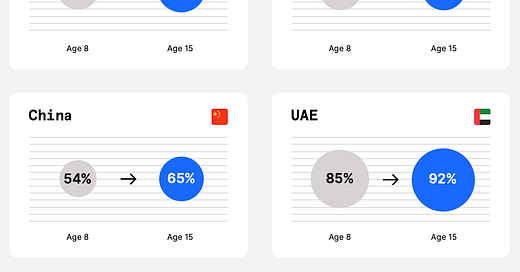Saying the quiet bit out loud
Between flights to Buenos Aires last week, I mostly consumed Taylor Lorenz’s excellent history of influencers (I think both it and Mark Bergen’s book should be required reading for anyone building any sort of creator platform). The subtext of Taylor’s book is just how much younger generations of internet users have driven the growth of today’s mainstream content platforms. Covering the history of each new platform (YouTube, Vine, TikTok etc.) there is consistently a wonderful moment when someone has the bright idea of launching a conference to bring new-platform creators together with their fans and every single time the reaction is ‘wait, they’re all kids?!?’.
In the context of the US election, there has been lots of discussion about Joe Rogan but not really that much about what is happening below (demographically speaking) that line so it was very interesting to listen to Josh Citarella talk about his observations of what’s happening around US teens and politics. His newsletter has some excellent long-form writing on this too.
A lot of people (including me) get depressed about the way that demographics are going and the impact of this on future economic growth. However a lot of people (also including me) often overlook the fact that we are about to feel the heft of the biggest wave of young people the world has ever seen. As a percentage of current world population, Generation Z (kids born between 1997-2012) will be peak young people i.e. the largest new cohort relative to the existing global population, reaching about 26% of the total population. Gen Alpha (kids born between 2013-2028), although people often describe them as the biggest wave, will actually be slightly smaller, reaching a global peak of 23% of the population.
Size may not be everything though. You can think of the impact of young generations as a function of 1) available time 2) device penetration and 3) economic firepower. So the attention economy dynamics (i.e. an ad model which wasn’t predicated on digital spending) of the last decade’s platform successes have been perfectly suited to capturing the Gen Z impact.
The impact of Gen Alpha as a young audience will be historically unique: for the first time a generation of kids will have a positive number in the economic firepower column. Since 2017 there has been at least $1.3b1 invested into fintech for kids and teens. That number is a gross understatement of what’s been happening: it doesn’t include the kids/family support from Revolut, Apple Cash, Google Pay etc. As far as I can tell (please DM me for corrections), nobody has reliably sized this new cohort of spending capability but there are plenty of directional proxies which suggest the answer could be ‘quite large’. Probably the most interesting data-set I’ve read on this recently was last month’s Checkout.com report on consumer spending, which amongst other nuggets had looked at the question of spending independence amongst kids:
While Gen Z was the first truly digitally native generation, Gen Alpha is the first truly digitally native merchant generation. A few weeks ago, I was speaking at a gaming event in London organised by investment bank Goodbody, which was generally lamenting the lack of growth across the board with the notable exception of the (primarily Gen Alpha/Z-fuelled) UGC category. When you consider that Gen Z largely drove early growth for YouTube, Instagram, TikTok, Snapchat, Fortnite, Minecraft and Roblox, it is more than mildly interesting to think about Gen Alpha’s impact which combines most of the same human scale but several orders of magnitude of increased purchasing power at a far earlier age than we’ve ever seen.
Even when you know where the future is going, it can be surprisingly tricky to capture value from it. Investing into new generations has always been fraught with experience bias, compliance challenges and a general ick factor. It will be interesting to watch who (and specifically how) investors lean in here.
“You know my passion/money and high fashion” - Skepta
Based on my Crunchbase research



